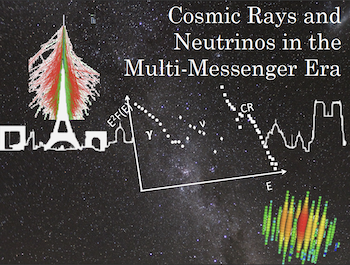Orateur
Description
Quantification of the significance of a candidate multi-messenger detection of cosmic events is an emerging need in the astrophysics and astronomy communities. All the searches and analyses done so far are on two messenger coincidences. However, with improving sensitivities of the detectors (i.e. upgrades in LIGO/Virgo/KAGRA, IceCube Gen2, KM3NeT, Vera Rubin Observatory, Ultrasat…), more than two messenger coincidences are inevitable. As an example, in December 2019, during the real-time neutrino counterpart follow-up of LIGO/Virgo’s gravitational wave (GW) candidates by IceCube, a candidate neutrino was reported by gamma ray coordinates network (GCN) notice. Soon after, HAWC observatory also reported a subthreshold gamma-ray detection which coincided with both the neutrino and the GW candidate. However, due to lack of a statistical treatment for multiple messengers’ coincidence, that coincidence’s significance could not have been quantified.
In this study we address the optimal multi-messenger search problem. In general for multi-messenger searches, model independent optimal search does not exist. Here we present a general Bayesian method for the optimal model-dependent search, which is scalable to any number and any kind of messengers, and applicable to any model. The method is based on weighting different sub-hypotheses, which describe each messengers’ origin (astrophysical or noise) and relation to other messengers, based on the assumed emission rates.
Details including an analysis for a gravitational-wave, neutrino, gamma ray coincidence can be found in the paper https://arxiv.org/abs/2010.04162. The treatment here is was designed to be adoptable by the LLAMA pipeline infrastructure (https://multimessenger.science), which is used for GW+ high energy neutrino searches [1,2] in the advanced gravitational-wave detectors era.
[1] IceCube Collaboration, IceCube Search for Neutrinos Coincident with Compact Binary Mergers from LIGO-Virgo's First Gravitational-wave Transient Catalog, ApJL 898 L10 https://doi.org/10.3847/2041-8213/ab9d24
[2] Azadeh Keivani et. al., Multi-messenger Gravitational-Wave + High-Energy Neutrino Searches with LIGO, Virgo, and IceCube, PoS-ICRC2019-930, https://arxiv.org/abs/1908.04996
| Related session | Multi-messenger |
|---|




